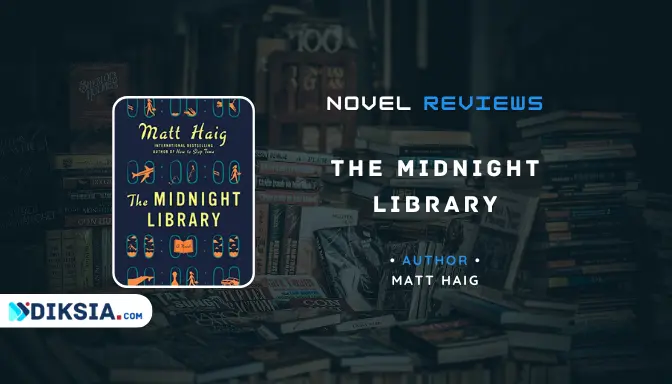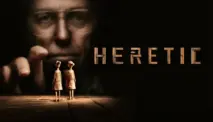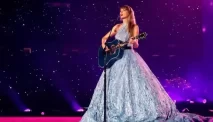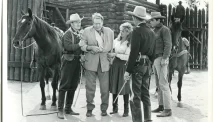Diksia.com - Have you ever wondered how your life would be different if you had made different choices? What if you could explore the infinite possibilities of your existence and find out what truly makes you happy?
This is the premise of The Midnight Library, a novel by Matt Haig, a bestselling author from England.
The Midnight Library is a fantasy novel that explores the themes of regret, happiness, and the meaning of life through the eyes of Nora Seed, a young woman who is dissatisfied with her life and decides to end it.
However, instead of dying, she finds herself in a mysterious library that contains books of all the lives she could have lived if she had made different decisions.
With the help of a librarian, she gets to try out some of these lives and see how they would affect her and the people around her.
The Midnight Library is a novel that combines elements of science fiction, magical realism, and philosophy to create a captivating and thought-provoking story that will make you reflect on your own life and choices.
In this article, we will review The Midnight Library by Matt Haig and discuss its plot, characters, themes, writing style, pros and cons, and conclusion. We will also provide a meta description and relevant tags for this article.
Novel Details
- Title: The Midnight Library
- Author: Matt Haig
- Genres: Fiction, Fantasy, Contemporary, Magical Realism
- Chapters: 32
- Rating: 4.01/5 (Goodreads)
- Language: English
- Publisher: Canongate Books
- First published: August 13, 2020
Synopsis
Nora Seed is a lonely and depressed woman who feels like she has nothing to live for. She has lost her job, her cat, her brother, her best friend, and her fiance.
She regrets many of the choices she has made in her life and wishes she could have done things differently. On the night of her 35th birthday, she decides to take an overdose of antidepressants and end her misery.
However, instead of dying, she wakes up in a strange place called the Midnight Library, a library that exists between life and death and contains books of all the lives she could have lived if she had made different choices.
There, she meets Mrs. Elm, her old school librarian who acts as her guide and mentor. Mrs. Elm explains to Nora that she can choose any book from the library and enter the life that it represents.
She can also return to the library at any time if she is not satisfied with the life she has chosen. However, there are some rules and limitations.
Nora cannot change anything in the lives she visits; she can only experience them as they are. She also cannot stay in any life forever; she has to make a final decision before the library closes or else she will die.
Moreover, Nora has to deal with the consequences of her choices on herself and others; some lives may be better for her but worse for others, and vice versa.
As Nora explores various lives where she is a rock star, an Olympic swimmer, a glaciologist, a pub owner, a wife, a mother, and more, she learns more about herself and what truly matters to her.
She also realizes that every life has its own challenges and joys, and that happiness is not a destination but a state of mind. Will Nora find a life that suits her best?
Will she be able to return to her original life and appreciate it more? Will she discover the meaning of her existence and find peace with herself?
Plot Analysis
The plot of The Midnight Library can be divided into four stages:
Initial Exposure
This stage introduces Nora’s original life and the reasons why she wants to end it. We learn about her background, personality, relationships, dreams, regrets, and problems.
We also learn about some of the choices that have shaped her life, such as quitting swimming, dropping out of university, breaking up with Dan, leaving Ash’s band, losing contact with Joe, etc.
Main Conflict
This stage presents Nora’s dilemma of choosing between different lives in the library. We follow her as she tries out various lives where she has different careers, partners, families, friends, locations, etc.
We see how each life affects her physically, mentally, emotionally, socially, etc. We also see how each life affects others around her positively or negatively.
Peak Story
This stage shows Nora’s realization of what truly matters to her and what makes her happy. We witness her growth as a person and her appreciation of her original life.
We also witness her confrontation with the library’s rules and limitations, such as the possibility of dying, the impossibility of changing anything, the difficulty of choosing, etc.
Completion
This stage reveals Nora’s final decision and its consequences. We find out whether she chooses to stay in one of the lives she has visited, to return to her original life, or to die.
We also find out how her decision affects herself and others, and what lessons she has learned from her journey.
Character
The main character of The Midnight Library is Nora Seed, a 35-year-old woman who is unhappy with her life and wants to die.
She is a complex and dynamic character who undergoes a significant transformation throughout the novel. She starts as a pessimistic, insecure, lonely, and depressed person who feels like she has no purpose or value.
She blames herself for everything that goes wrong in her life and regrets many of the choices she has made. She also feels like she has disappointed everyone who cares about her and that she has no one to turn to.
However, as she visits different lives in the library, she gradually changes into a more optimistic, confident, sociable, and joyful person who realizes that she has many talents and potentials.
She also learns to forgive herself and others for their mistakes and to appreciate the small things in life. She discovers that happiness is not dependent on external factors but on internal ones, and that every life has its own challenges and joys.
She becomes more aware of her own feelings and desires, and more respectful of other people’s feelings and desires. She also develops a stronger sense of self-worth and self-love, and a deeper understanding of the meaning of her existence.
Some of the supporting characters in The Midnight Library are:
- Mrs. Elm: Nora’s old school librarian who acts as her guide and mentor in the library. She is a kind, wise, patient, and supportive woman who helps Nora navigate through the library and gives her advice and encouragement. She is also a mysterious figure who knows more about Nora than Nora herself.
- Dan: Nora’s ex-fiancé who broke up with her a few days before their wedding. He is a handsome, successful, charming, and adventurous man who works as a travel journalist. He is also a selfish, unfaithful, insensitive, and manipulative man who cheated on Nora with another woman and lied to her about it.
- Ash: Nora’s childhood best friend who formed a band with her when they were teenagers. He is a talented, passionate, loyal, and fun-loving musician who always believed in Nora’s potential as a singer and songwriter. He is also a troubled, rebellious, addicted, and unstable person who struggles with drug abuse and mental health issues.
- Joe: Nora’s estranged brother who cut off contact with her after their father’s death. He is a smart, caring, generous, and humorous man who works as a teacher and volunteers at an animal shelter. He is also a bitter, angry, resentful, and distant person who blames Nora for their father’s death and for abandoning him.
- Izzy: Nora’s former swimming coach who trained her to become an Olympic swimmer. She is a strict, demanding, ambitious, and competitive woman who pushed Nora to excel in swimming and achieve her goals. She is also a supportive, proud, protective, and loving woman who cared for Nora like a daughter.
Theme and Message
The Midnight Library explores various themes that relate to human existence, such as:
- Regret: The novel examines how regret can affect one’s life negatively or positively, depending on how one deals with it. It shows how regret can lead to depression, self-loathing, guilt, resentment, etc., but also how regret can motivate one to change, improve, learn, etc.
- Happiness: The novel investigates what happiness means for different people and how it can be achieved or lost. It shows how happiness can depend on external factors such as career, money, fame, love, etc., but also how happiness can depend on internal factors such as attitude, perspective, gratitude, etc.
- Choice: The novel explores how choice can shape one’s life in various ways and how it can have consequences for oneself and others. It shows how choice can create opportunities or limitations, possibilities or regrets, happiness or sadness, etc.
- Meaning: The novel questions what meaning one can find in one’s life and how it can affect one’s well-being. It shows how meaning can come from different sources such as passion, purpose, connection, etc., but also how meaning can be elusive or subjective.
The main message of The Midnight Library is that every life has value and potential, and that one should appreciate one’s life instead of wishing for another one.
The novel suggests that one should not dwell on the past or the future, but live in the present and make the best of it. The novel also implies that one should not take life for granted, but cherish every moment and opportunity.
The novel encourages one to be open-minded, curious, adventurous, and courageous in exploring one’s potential and pursuing one’s passion.
The novel inspires one to be compassionate, empathetic, generous, and forgiving towards oneself and others. The novel reminds one that one is not alone, but connected to a larger network of people who care and support one.
Writing Style
The writing style of The Midnight Library is simple, clear, and engaging. The novel is written in the third-person limited point of view, focusing on Nora’s thoughts and feelings as she travels through different lives.
The novel uses a mix of narration, dialogue, description, and reflection to create a vivid and immersive experience for the reader.
The novel also uses various literary devices, such as metaphors, similes, imagery, symbolism, irony, foreshadowing, etc., to enhance the meaning and impact of the story.
For example, the library itself is a metaphor for Nora’s subconscious mind, where she can access all the possibilities of her existence. The books are symbols of the choices she has made or could have made in her life.
The clock is a symbol of the time she has left to make a final decision. The green book is a symbol of her root life and her true self. The novel also uses irony to create contrast and tension between Nora’s expectations and reality.
For example, when Nora chooses a life where she is married to Dan, she expects to be happy and fulfilled, but instead she finds herself bored and miserable.
When Nora chooses a life where she is a famous singer, she expects to be admired and respected, but instead she faces criticism and harassment.
Pros and Cons
The Midnight Library is a novel that has many pros and cons depending on the reader’s preferences and expectations.
Pros:
- Thought-provoking exploration of life choices and regret
- Engaging and relatable characters
- Skillful blending of fantasy and contemporary fiction
- Beautifully written prose that evokes deep emotions
Cons:
- The pacing may feel slow at times for readers seeking a fast-paced plot
- Some readers may find the fantastical elements less engaging than the contemporary aspects
Conclusion
The Midnight Library is a novel that offers a fascinating and thought-provoking exploration of human existence through the lens of choice and regret.
It is a novel that combines elements of science fiction, magical realism, and philosophy to create a captivating and moving story that will make you reflect on your own life and choices.
It is a novel that celebrates the value and potential of every life, and encourages you to appreciate your life instead of wishing for another one.






